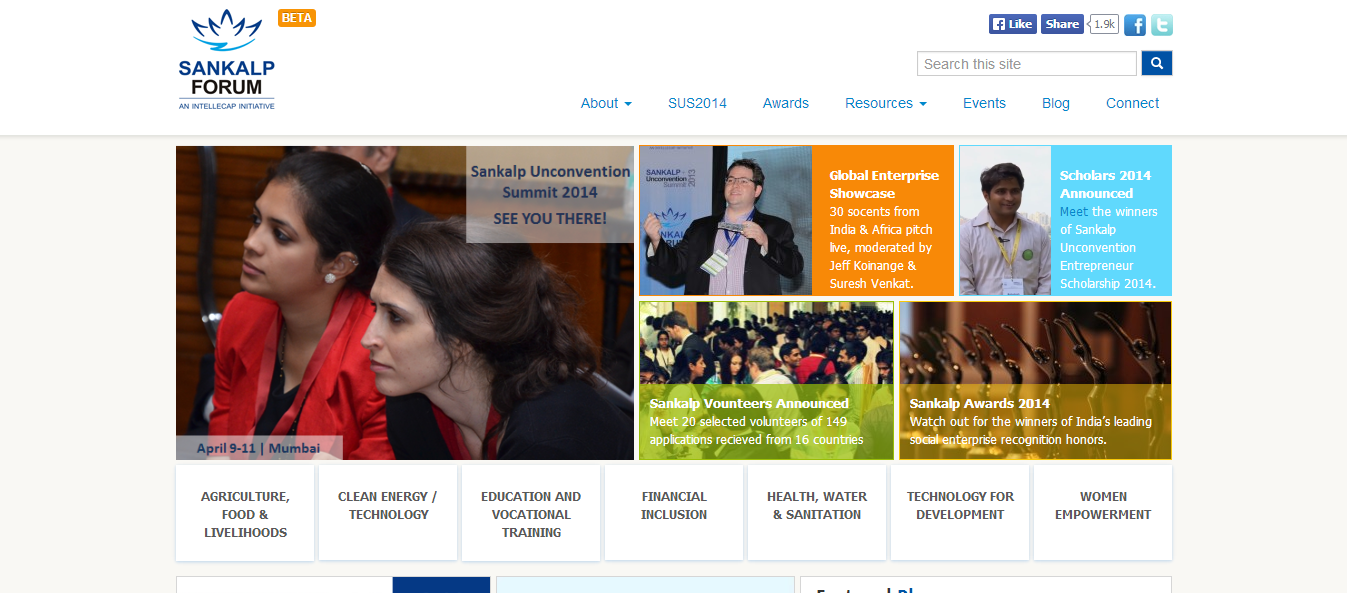The rigorous Sankalp Social Enterprise Awards announced their 6th set of winners after an application, evaluation, and mentoring process that lasted over 6 months. Out of the 165 applications received only for operational, revenue-earning early stage enterprises, 24 finalists were selected. These were companies with the highest potential for immediate scale. Interestingly, 21 of these 24 finalists have operations in India’s low income states like Jharkhand, Chattisgarh and Odisha.
Aparajita Agrawal, Director – Sankalp Forum, said, “The true impact potential of social enterprises is at the base of the economic pyramid, therefore seeing an operational focus in low income regions of India is extremely encouraging.” She added, “This year’s process also had about 46% of the finalists in growth stage, seeking equity to tap newer geographies and markets. In fact, the average ticket size that each enterprise is looking to raise in equity is close to INR 9 crore.”
The winners for 2014 are:
Agriculture, Food & Livelihoods: Swayambhu Biologics
Swayambhu has created a revolutionary and proprietary compost technology titled Accelerated Rapid Biological Intervention Technology (ARBIT), which is a first of its kind in the world. It composts bio waste in 14 days as against the existing 90-120 days. ARBIT PROM is directly sold to sugarcane farmers through schemes promoted by respective industries and the money is collected through their payment adjustment systems. In one crushing season alone, Swayambhu processed 25000 tonnes of pressmud producing 15000 tonnes of PROM reaching out to 3000 farmers and 15000 acres in 4 industrial areas and expects to grow exponentially.
Clean Energy / Technology: Aura Herbal
Aura Herbal makes herbal textiles and dyes, and helps in impeding pollution and the harm caused by regular textile dyes. The enterprise also recycles the solid as well as liquid waste produced, to generate fabric that is 100% eco-friendly.
Education & Vocational Training: Karadi Path
The Karadi Path methodology is a unique and indigenously developed pedagogy based on mother tongue learning and the unique Indian experience of multilingualism. It provides high-impact, low-cost programs to deliver English language proficiency to children and adults, even in environments where the language is not supported. The methodology is designed such that even teachers who are not highly proficient in English can deliver these programs effectively. Karadi’s programs are being implemented in 276 institutions in rural, semi-urban and urban schools and colleges covering 55,000 children across Tamil Nadu, Karnataka, Andhra Pradesh, Goa, Maharashtra, Gujarat and Kerala.
Financial Inclusion: Kinara Capital
Kinara Capital provides loans in the range of USD 2K- USD 20K (Rs.100,000 to Rs.1,000,000) to micro and small enterprises in India filling the gap between microfinance and commercial capital. The enterprise works with network partners (buyers, trade organizations, franchisors, etc.) across supply chains to source and fund working capital needs of small manufacturing businesses, artisan clusters and agri-retailers.
Health, Water & Sanitation: iKure
With only 30 per cent of the country’s combined medical forces serving 840 million people in rural India, iKure has been formulated to address the pressing need of health care among the country’s rural population. The enterprise provides accessible and affordable primary care using technology called WHIMS enabling last mile reach to quality primary care. To bridge the rural-urban health disparity, it has established a network of Rural Health Centres (RHCs) across remote areas of West Bengal. Each of its RHCs resourced with qualified MBBS doctors, nurses, para-medics, and diagnostic tests facilities provides a one-window approach for primary health needs of the community.
Technology for Development: Spatial Ideas
Spatial is building an e-Gov platform for India. The enterprise uses technology to bring transparency, accountability and efficiency in important citizen services such as sanitation, healthcare, public distribution system, employee accountability, etc. With the help of an innovative platform that converges Geographic Information System (GIS), mobile applications, Business Intelligence and Biometrics (Face and Fingerprints) it enables real time dashboards, SMS Alerts, email reports, insightful maps for decision makers by connecting citizen touch points using tablets/phones.
Women Empowerment: MicroGraam
MicroGraam is an online peer-to-peer lending platform that brings several innovations to traditional micro-credit. It offers flexible repayment terms and low interest rates to borrowers. Under its micro ventures model, micro-venture capitalists provide upfront funding to micro-entrepreneurs to build a small business, the two parties share in profits or losses for a pre-determined number of year. Most (85-90%) of its borrowers are women from extremely low-income backgrounds.
Clean Cookstoves: Nokooda
Nokooda brings a fresh perspective on decentralization of Waste to Energy projects at economically affordable costs for all stakeholders. It implements a Decentralized Organic Reject Management (DORM) solution, which is a compact, cost effective & zero pollution solution, highly effective in re-processing rejects thus saving landfill space, reducing the environmental pollution and providing quality re-processed products for end consumers. Organic Waste from horticulture, vegetable & fruit Mandis, temples & Residential Units primarily are converted into clean energy sources and products, which include organic animal feed and fertilizer.
Sankalp People’s Choice Awards: iMerit
iMerit was created with the vision to bring the power of the Internet economy to rural youth and women to create jobs, build sustainable livelihoods, and empower marginalized communities. Combining technology innovations and strong account management, its beneficiaries become employees delivering high quality IT services such as Digital Publishing, Data Analytics, and Application testing to global clients including multinational corporations, libraries, academic institutions, major non-profits, and startups among others.
It works closely with sister organization Anudip Foundation, which trains over 1,500 youth and women from BoP every quarter.













